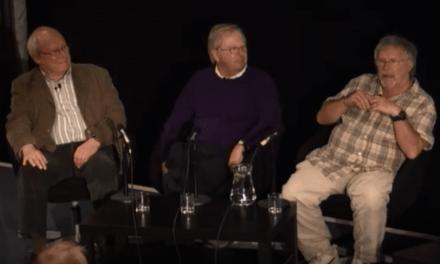
The title of a Heroes Episode (1.17). Image from Heroeswiki.com
Heroes (NBC, 2006-2010) has come and gone. The once promising NBC series, in its first season a world-wide cult phenomenon, flamed out, beginning in Season Two. One of its innovations, beginning with the pilot, was its visible inclusion of the title of each episode in the diegesis. Superimposed on the Manhattan rooftop from which Peter Petrelli is about to leap in the series’ opening scene we find the word “Genesis,” 1.1’s title. In “Collision” (1.4) the title can be found on Claire’s “corpse” just before the coroner cuts her open. “Company Man” (1.17) appears in the sky over the Bennet house. On Sylar’s color palette as he paints in Isaac’s studio we read the title of Heroes’ infamous Season One finale “How to Stop an Exploding Man” (1.23). Finding these, waiting for that brief moment when each episode’s title would flash before our eyes, became part of the engaged viewing experience of Heroes’ (once) avid fan base.
For much of American television’s history the titles of the episodes were invisible. Watching Gunsmoke, Bonanza, Get Smart, The Dick Van Dyke Show, The Man from Uncle as a child, it never occurred to me to wonder what a particular episode was called. The movies I saw at Oil City, Pennsylvania’s old-fashioned movie palace The Drake had titles—clearly visible on the marquee outside. The books and stories I was forced to read in English class (The House of the Seven Gables, “The Tell-Tale Heart”) were clearly entitled. For all I knew, the prime-time television series which held me captive every evening were not. Some shows, of course, do not have titles, visible or invisible. ABC’s extremely influential Twin Peaks (1990-91) had none (though it acquired them with its long-delayed DVD release), and even today some British series are not entitled: Life on Mars (BBC, 2006-2007), Being Human (BBC3, 2008- ), The Hour (BBC2, 2011- ) come to mind.

Image from Amazon.com
A special issue of Critical Studies in Television examined “invisible television,” considering shows and genres that flew so far below the radar as to be largely unnoticed. Until recently, titles were seldom seen. Now, however, clever and imaginative television titles have become increasingly important paratexts, highly visible (on cable and satellite program viewing guides, on ITunes, in TV Guide and Radio Times, on television recap guides like Television without Pity and Onion TV Club, even on screen) and often key to a show’s branding. The following is a far too random “title search” (a pre-requisite for any exchange of real estate!). These notes and queries are intended to get the discussion started. I hope readers will post comments with their own favorite titles and observations concerning television’s titular future.1
On Seinfeld, the form of episode titles (“The Chinese Restaurant,” “The Little Kicks”) was the result of Seinfeld not wanting writers spending time and creative energy on them (“Inside Look” for “Male Unbonding”). Only “Male Unbonding” lacks the “the.” Its lesser (IMHO) contemporary Friends named its episodes in the same way fans would recollect them after the fact: “The One with the Sonogram at the End,” “The Last One.”
As I wrote about in recent Telegenics, the titles of current cultish sitcoms like Big Bang Theory—whose titles invoke pseudo-scientific mumbo jumbo (“The Luminous Fish Effect,” “The Loobenfeld Decay,” “The Pancake Batter Anomaly,” “The Killer Robot Instability,” “The Cruciferous Vegetable Amplification,” “The Thespian Catalyst,” “The Prestidigitation Approximation,” “The Roommate Transmogrification”) and Community—which uses the names of real or imaginary college courses (“Applied Anthropology and Culinary Arts,” “Contemporary American Poultry,” “Cooperative Calligraphy,” “Epidemiology,” “Social Psychology,” “The Politics of Human Sexuality”) are decidedly less humdrum and predictable.
24 (FOX, 2001-2010) was a narratologically and televisually inventive series, but its episode titles were nothing more than time markers: “Day 8, 300-400 PM.”
The quirky titles of Damages (FX, 2007-2010; Audience Network, 2011- ) turn out to be unpredictably odd lines of dialogue from the episodes: “The Dog Is Happier Without Her,” “Don’t Throw That at the Chicken,” “Drive It Through Hardcore, “”The Next One’s Gonna Go In Your Throat.”
CBS’s The Good Wife started out with single word titles (“Stripped,” “Running”), but managed to keep that pattern up for its first season only. Rescue Me (FX, 2004-2011), on the other hand, stuck with them for all seven seasons, beginning with “Guts” and ending with “Ashes.”
The best series on American television (IMHO), AMC’s Breaking Bad (2008-2012), gives us titles as captivating as its narrative. Titles like “Mandala” and “Kafkaesque” provoke questions (answered in the episodes), and the titles of its just-concluded terrific penultimate season become more than customarily enigmatic: “Box Cutter,” “Thirty-Eight Snub,” “Bullet Points,” “Shotgun,” “Problem Dog,” “Crawl Space,” “End Times,” “Face Off,” each fully explicable by the time the closing credits roll. The eponymous box cutter? Used by Gus Fring to slice and dice his man Victor and instill fear in Walt and Jesse. “Face-off”? A reference to the 1997 John Woo Nicolas Cage/John Travolta film? Nope. An accurate description of the state of crystal meth mastermind’s countenance after Walt’s bomb explodes (now available as a Halloween mask).

Gus Fring, face-off, in “Face-Off” (screen capture)
You might not expect a series about an outlaw California motorcycle gang to have puzzling, inscrutable titles, but Sons of Anarchy’s not-very-well-received third season got its Irish up when SAMCRO journeys to the Emerald Isle, beginning with “Widening Gyre”—a title taken from the great Irish poet William Butler Yeats’ “The Second Coming”—and then “Lochan Mor,” “Turas,” “Firinne,” “Bainne”—Gaelic for, respectively, “big pond,” “journey,” “truth,” “milk.”
Like Matt Groening’s other show (The Simpsons), Futurama is delightfully self-referential and intertextual, and so, not surprisingly, are titles like “The Series Has Landed,” “I, Roommate,” “Love’s Labours Lost in Space,” “Fear of a Bot Planet,” “A Fishful of Dollars,” “My Three Suns,” “Hell Is Other Robots,” “A Flight to Remember”—evoking, respectively, Asimov, Shakespeare, Public Enemy, Sergio Leone, a classic American sitcom, Sartre’s No Exit, and a 1950s film about The Titanic.
Often touted as television’s greatest drama, The Sopranos (HBO, 1999-2007) gave us a diverse, characteristically intertextual variety of titles alluding to the size of a man’s suit (“46 Long”), Elizabeth Kübler-Ross’s stages of grief (“Denial, Anger, Acceptance”), a town in New Jersey (“Down Neck”), a comparison of the great playwright Tennessee Williams and a nearly illiterate, aspiring mobster author (“The Legend of Tennessee Moltisanti”), a city in Florida (“Boca”), a profane version of a silly phrase for goodbye (“Toodle-Fucking-Oo”), a Stanley Kubrick war movie (“Full Leather Jacket”), a Fred Zinnemann war movie (“From Where to Eternity”), a PBS children’s television show (“Mr. Ruggerio’s Neighborhood”), words from a Christmas carol (“To Save Us All from Satan’s Power”), a wooded area of New Jersey (“Pine Barrens”), a French phrase for “crazy love” (“Amour Fou”), a military recruiting poster (“Army of One”), a phrase on US currency (“For All Debts Public & Private”), a police radio call phrase (“Calling All Cars”), a phrase from Tolstoy’s Anna Karenina (“All Happy Families”), a novel by Flaubert (“Sentimental Education”), a children’s swimming pool game (“Marco Polo”), a wedding invitation (“Mr. & Mrs. John Sacramoni Request”), a motto on New Hampshire’s license plate (“Live Free or Die”), a cornbread flatcake popular in New England (“Johnny Cakes”), a song by Franki Valli and the Four Seasons (“Walk Like a Man”), the same Yeats poem evoked in Sons of Anarchy (“The Second Coming”), a model of toy train (“The Blue Comet”).
 Images from ECW Press
Images from ECW Press
In the recently published book Stacey Abbott and I edited on the series (WB, 2005-2006; CW, 2006- ), essays by both Stan Beeler and Mikel J. Koven and Gunnella Thorgeirsdottir address Supernatural’s similarly eclectic and intertextual titles, evoking everything from urban legends (“Bloody Mary”), television shows (“Route 666”), movies (“The Curious Case of Dean Winchester,” “Sam, Interrupted,” “Weekend at Bobby’s”), and classic rock (“The Kids are Alright,” “Dark Side of the Moon,” “Sympathy for the Devil”).
 Image from Amazon.com
Image from Amazon.com
On Bryan Singer’s “brilliant but cancelled” Wonderfalls, a clerk in a Niagara Falls souvenir shop does the bidding of a variety of curios who talk to her. Its titles, appropriately, take their names from each episode’s totem animal: “Wax Lion,” “Wound-up Penguin,” “Pink Flamingo,” “Barrel Bear,” Muffin Buffalo.”
To the best of my knowledge, no late night talk show has ever given its individual programs titles—until Conan. At the beginning of each episode of Conan O’Brien’s return-to-television after the Tonight Show fiasco, sidekick Andy Richter announces that night’s usually weird, sometimes obscure, almost always intertextual, mostly hilarious name (displayed as well on-screen):
The Girl With the Dragon Tattoo on Her Face Was Unemployable
Death Takes a Staycation
The Fluffer of Seville

Screen Capture from Conan
President Björk Saves the Day
The One Hour of Footage George Lucas Hasn’t Messed With
Eat, Love, Lather, Rinse, Repeat
I Know What You Did Last Lobsterfest
Paper or Plastique?

Screen Capture from Conan
The Turducken Kerfuffle

Screen Capture from Conan
The comedy of Conan O’Brien, a host who used to have a lever at his side (on the Late, Late Show) that played a random, risible, self-satirical Walker, Texas Ranger (CBS, 1993-2001) clip, has always been postmodern, but Conan’s titles are PoMo x 10. A reference to the blockbuster Stieg Larsson novel (and films); a 1934 Frederic March film updated according to the latest tradition in non-travel; a classic Rossini opera brought into the world of porn; a Victor Hugo classic spliced with a Georgia, USA two year college; the Icelandic singer/performance artist starring in a political thriller; the Star Wars creator’s unseemly penchant for revising his masterwork; Elizabeth Gilbert’s bestselling memoir crossed with shampoo instructions; a melding of a Red Lobster (restaurant) special and a 1997 Jennifer Love Hewitt horror film; an explosive grocery story query; an unpronounceable Gulliver’s Travels allusion; a disturbance brought on by turkey-stuffed with a chicken-stuffed with a duck; a Satanic agreement before a marriage. What kind of person could be expected to possess all the high/low/no brow knowledge necessary to get these jokes?
Now partially entitled, your own further explorations are invited and encouraged. Who knows? There might even be a scholarly article or even a book on this. If only we could think of a title . . .
1 Readers may also wish to check out Entertainment Weekly’s “What Are Your Favorite TV Episode Titles?” ↩





